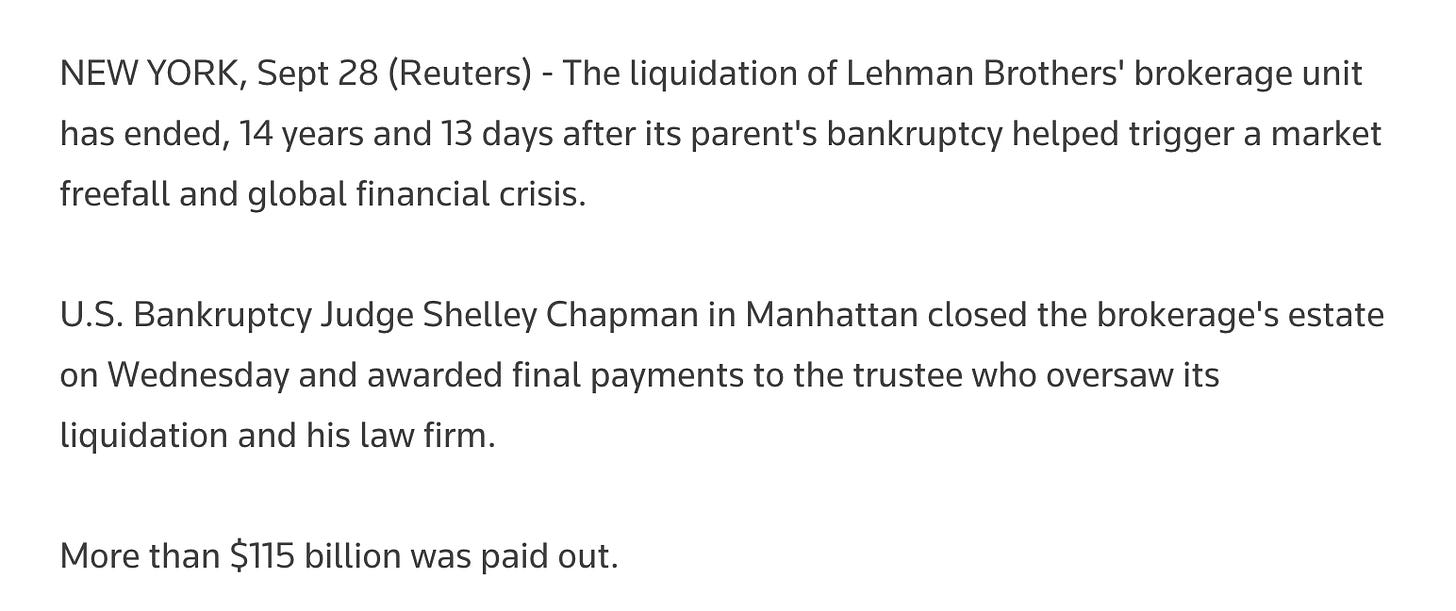CDS Swaps and Credit Sus for Newbies
Level 1 - Definitely NGMI
Welcome Avatar! It looks like Credit Sus ($CS) is on the brink of collapse. There is no way a cartoon account can move that market so we’ll explain what is happening in simple terms. Instead of going through all the details this will be once again a simple version so you can tell your date while announcing you cannot afford $3 cheese.
Part 1: What is Credit Sus
Credit Suisse is one of the largest investment banks in Switzerland. As a reminder this is how banks make money:
You deposit $1M
They lend out that $1M at say 5% interest
They pay you 2% interest
Bank makes 3%
Sounds great. Until those loans go bust which is exactly what a bond is. Bond/loan is the same thing but Wall Street creates new words every week to justify their jobs and pay. See bonds for newbies here.
Part 2: What Is Happening and What is a CDS?
Okay now that we have a good understanding of what banks do. What is a CDS?
A CDS is a “Credit Default Swap” or CDS? Well this is another fancy phrase for “Insurance”
Lets review:
Customer gives bank $1M
That is lent out at 5%
(Ruh Roh!) the person doesn’t make payments!
It defaults
The $1M is gone
Now as you can see we can make one slight adjustment and you can see the value of “insurance”
Credit Sus Lends outs $700,000,000,000
All of the loans default
As you can see from that simple example you would destroy practically everything. Luckily there is something called a “CDS = Insurance”
Buy Insurance (CDS): A CDS would allow you to get your *principal* back. This is a pretty significant amount of money. Say the bank lends you $1M at 5% interest. You pay the first 2 years but suddenly default.
Well there are companies that provide insurance and if the loan isn’t paid you get your entire principal back!
How this Works
Credit Sus lends out $1B
There is insurance on that $1B
If the loans go bad at least they get your money back!
Now here is the problem. The CDS tells you how healthy the bank is.
Put it layman terms. Say you want to buy insurance on your $1M house. Everyone knows that is for disaster situations. So you buy insurance that costs say $5,000-$10,000 a year to protect your $1M home (0.5-1.0%). Seems simple and not crazy. In the rare case the house gets wiped out you’re paying 0.5-1.0-% (yes we used a large range on purpose).
This is exactly what the bank does with the loans as well. There are “CDS” products (read insurance) that are bought/sold to buy claims to the principal.
Part 3: Put It All Together
To recap. A CDS on a $1B 10-year loan paying 5% can be purchased. If the person stops paying the 5%, you will still receive $1B if you own the insurance (CDS). While you don’t get those 5% annual payments are least you protected your principal.
Click the History Tab - Lehman: Lehman brothers went under on September 15, 2008. Now we go and check what the CDS on Lehman debt was trading at. Total cost of insurance on $10M of loans was $650,000.
Okay we have a good comparable now.
Time to check in on CDS current numbers for Credit Sus…
As you can see this is *worse* than Lehman. It is saying it costs $1M to buy insurance on $10M of loans.
Part 4: If CS Goes Under
Now you can see what is happening. There is an extremely high chance that Credit Suisse Equity does in fact go to zero (it is a bank after all).
Likely Scenarios *IF IT GOES UNDER NOT A GUARANTEE*:
Just like Lehman parts will be sold. We’re hearing that the US investment banking division will be sold off (ie. the guys doing M&A deals had no involvement in the decisions made at the bank so people would love to hire these guys)
Depositors would likely be “bailed out” again as the $54B exact number from the Swiss National Bank was strange to say the least
This would last a DECADE OR MORE to get the money back. Lehman claims finally ended after 14 years of liquidation proceedings (source). Emphasis on the bottom part of the screen cap where $115B was paid out over 14 years.
Wouldn’t be surprised to see UBS take a chunk of CS making the bank practically nationalized (opinion). We mentioned this earlier and suddenly zero hedge is now posting the same (Source)
This will 100% impact you as companies around the world all interact with CS. While your bank deposits may be safe, remember that $700B represents a lot of money held by companies (companies that need the money to pay out customers, employees, bills etc.)
Final Note: This would be a titanic sized earthquake for the financial system. No other way to explain it. In fact some prominent people are already saying all the troubles in the banking system will end with Hyperbitcoinization (as the Banking system fails)
Final Note
Before signing off, please do not follow Balaji blindly. While we recognize he is incredibly smart, the chances of something like this happening in 90 days is simply too fast. It is much more likely he owns call options or some massive position in BTC right now hence the call to action and massive hype to buy. If you’re a paid subscriber you already know what we’d be doing (ie. no need to bet on one situation vs. other deflation vs. hyperinflation)
On that note. Back to the tent.
Disclaimer: None of this is to be deemed legal or financial advice of any kind. These are *opinions* written by an anonymous group of Ex-Wall Street Tech Bankers and software engineers who moved into affiliate marketing and e-commerce. We’re an advisor for Synapse Protocol 2022-2024E.
2017-2020 Old Books: Are available by clicking here for paid subs. Don’t support scammers selling our old stuff
Crypto: The DeFi Team built a full course on crypto that will get you up to speed (Click Here)
Security: Our official views on how to store Crypto correctly (Click Here)
Social Media: Check out our Instagram in case we get banned for lifestyle type stuff. Twitter will be for money. At 10,000+ Instagram follows we will publish some city guides ranking each region we’ve been to.









Can't believe people still aren't noticing anything. One of the biggest events in recent history and no one's talking about it.
Guys, I am surprised you didn‘t figure out why it is those „surprisingly exact 54 Billion USD“.... The Swiss Central bank spokesman said „up to 50 Billion“, but obviously, he was talking in Swiss Francs, and with the current conversion rate, that ends up in those „oddly specific 54 Billion USD“.